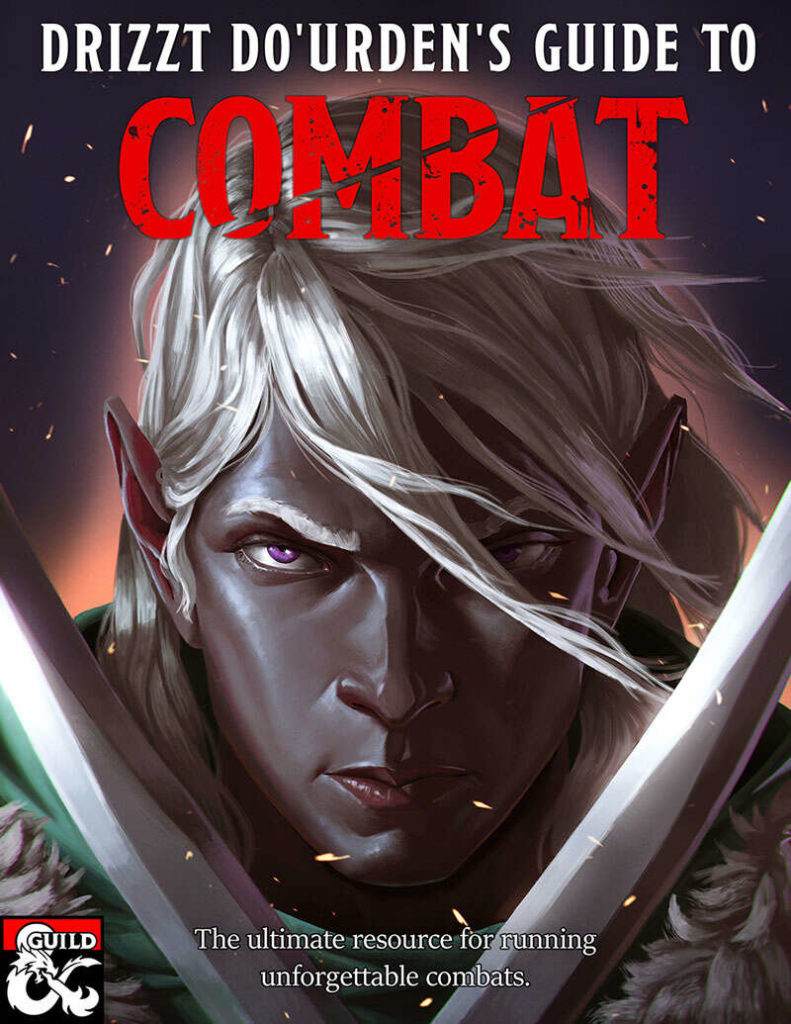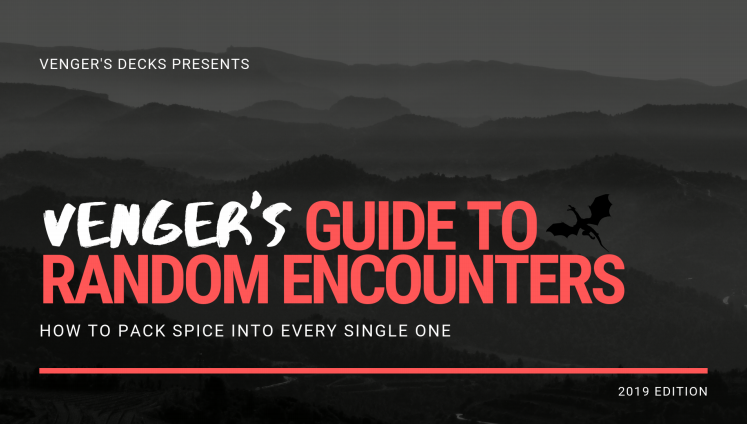Update: You can now hear our first adventure using Venger’s Decks
Many RPGs rely heavily on encounters – be they combat, shopping or interacting with NPCs. How you approach encounters is fundamental to what sort of game you are playing in. I strongly believe that DMs are also players in the game, rather than being the opposition that is trying to defeat or kill the player characters. So I was thrilled to see two e-books on this topic – ‘Drizzt Do’Urden’s Guide to Combat’ by Darrin G. Scott and ‘Venger’s Guide to Random Encounters’ by Venger’s Decks – and to review them together as they have different approaches to covering similar ground. Both of these are focused on the DM, but also make interesting reading for players, even those who have no intention of running a game.
Drizzt Do’Urden’s Guide to Combat

‘Drizzt Do’Urden’s Guide to Combat’ by Darrin G. Scott is written as if by the D&D hero Drizzt Do’Urden, and focuses on looking at combat in a holistic way that includes all the other aspects of role playing in a strictly D&D 5E setting. Although its primary focus is on combat, it begins by covering what other options there are, including stealthily evading combat or achieving a peaceful resolution to an encounter. It then goes on to focus on the DM, the players, and aspects of how to run combats and encounters in game. All of the material is clearly discussed and explained from the point of view of a DM.
As this is a DMsGuild product, the author was able to use Drizzt as a character as well as referring back to the D&D 5E core books frequently. In style it is detailed, formal and philosophical, and while it explicitly refers only to D&D 5E, the contents are useful for GMing any tabletop roleplaying game. The extra depth and interest added to this book by having the lore and backstory of Drizzt available is substantial, but the author is careful not to allow the character-driven writing to overshadow the usefulness of it as a guide to creating and balancing combat.
Additionally, there are resources included such as print’n’play tokens, stat blocks and guides for turning mobs of creatures into squads (based on published swarm rules), which may allow them to gain some special abilities. The tokens come in a variety of sizes and include blank tokens for customised creatures or player characters (helpfully pointing out that art can be placed on a blank token prior to printing). The additions add a lot of practical value to the book.
Venger’s Random Encounter Decks

In contrast, ‘Venger’s Guide to Random Encounters’ by Venger’s Decks is a much shorter and more informal look at running encounters for any game system – partly because it’s designed as a companion piece for card decks which will help randomise encounters. However, it also stands up well on its own by concisely describing the benefits of a wider range of encounters and providing a variety of responses to potential encounters. It is written in a very colloquial style, which may make it somewhat harder for non-native speakers to catch all of the nuance – but the flow is very approachable regardless of the reader’s fluency in English.
This guide begins by actively encouraging its readers to embrace the chaotic nature of playing RPGs – the players will do something unexpected or a dice roll might really, really confuse the plot you were trying to steer them onto. Sometimes, you just want to make things more exciting. Whatever your motives for adding in a random encounter, it certainly ‘separates [this] game from all others.’ The observation that this is part of what makes a homebrew campaign stand out certainly reflects reality. It also reduces pressure on a GM to prepare a campaign which is fully written and paced, which is a massive relief as that pressure can prevent someone from running a game.
It then becomes more philosophical by examining four stages of preparing your encounters, with a strong focus on player agency prior to them engaging with the encounter. Generally, allowing your players to decide if and how to engage is more entertaining than a sneak attack and this principle is discussed in some depth. The 4 elements are summarised as ‘Hook, conflict, resolution, twist.’
As well as the discussion, the guide gives suggested questions to answer as well as some square and hex grids for planning your encounters. Venger’s Random Encounter Decks are mostly tailored to environments which allows you the freedom to create any reason for why that encounter may be happening. It is strongly recommended that this be done before the game, to allow time to weave an encounter into your world and scenario. It will be interesting to see these decks to test out these theories and see how it works in practice.
Which to read? Both!
These guides are largely complementary to each other. The similarity of the topics are clear, but they may be suited for different audiences. Drizzt is a piece to read slowly and consider, with some sections which r&&equire a lot of thought to fully absorb before putting into practice, particularly as the language is more formal. Venger’s is a faster overview that will be useful as a pre-game aid, or even during a game if the GM and players agree. Both raise similar points about allowing players to have agency and influence the direction of the game and suggest ways to chop and change your plans at little notice. Both are interesting and thought provoking, and certainly are both worth your time – and as ‘Drizzt Do’Urden’s Guide to Combat’ is already platinum on DMsGuild, it appears that others agree. Personally, I look forward to seeing Venger’s Random Encounter Deck in the near future. Chaos is something both I and my players favour at the table!
You can buy ‘Drizzt Do’Urden’s Guide to Combat’ at DMsGuild.com for $7.45 and ‘Venger’s Guide to Random Encounters‘ at VengersDecks.com for free by signing up for an email newsletter.
Review by Dragon.

